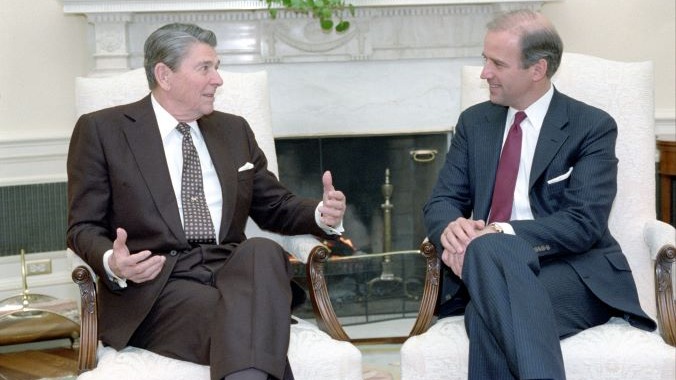How Ronald Reagan Did a Basic Foreign Policy Thing That Biden Struggled to Do
Photo by Series: Reagan White House Photographs, 1/20/1981 - 1/20/1989 Collection: White House Photographic Collection, 1/20/1981 - 1/20/1989, Public domain, via Wikimedia Commons
“These are American planes and American bombs, for people who have no relation with this dirty war,” a hospital official in Lebanon told the Washington Post in June 1982.
The official was describing a nearby air raid by Israeli forces during Israel’s invasion of Lebanon in 1982, an operation intended to expel the Palestinian Liberation Organization (PLO) from Lebanon that became a brutal siege of Beirut.
The hospital official claimed to the Post that Israel had dropped cluster munitions, explosives that, when fired, release dozens and dozens of tiny bomblets in air that can spread out over hundreds of feet. Those bomblets don’t always detonate immediately, leaving a lingering threat to civilians in areas where they’re deployed.
The Post did not find evidence of that during their hospital visit, though the reporter documented remnants of cluster munitions at a resort south of Beirut the week prior.
But allegations of Israel’s use of American-made cluster munitions in Lebanon mounted, and it forced the U.S. to act. Congress held hearings. In July 1982, President Ronald Reagan halted a shipment of 4,000 rounds of cluster munitions for use in 155-millimeter howitzers as the administration reviewed whether Israel had violated its agreements with the United States about the use of these weapons.
Before the end of the month, the Reagan administration made that an indefinite suspension. The prohibition on cluster munitions transfers lasted six years, until 1988.
That decision is being compared to President Joe Biden’s decision to quietly hold back the delivery of about 3,500 bombs, and his threat to withhold more offensive weapons if Israel invades Rafah. If you’re in favor of Biden’s move, then the argument is basically: if other presidents – especially Republican ones! – can do it, so can Biden. If you’re against the administration’s decision, it’s something along the lines of ‘this is a totally different thing, how dare you take Reagan’s name in vain.’
There is actually quite a long tradition of U.S. presidents threatening to withhold or rethink aid in order to pressure Israel. In 1957, Dwight D. Eisenhower threatened sanctions against Israel to try to force it to withdraw from the Sinai Peninsula. In the early 1970s, Richard Nixon delayed ordering jets for Israel. Gerald Ford wanted to reassess the entire United States-Israel relationship, and he once reportedly sent them a written warning. George H. W. Bush promised to block loans to Israel if it continued their settlement expansion.
Besides cluster munitions, Reagan halted the transfer of some fighter jets to Israel in 1981 after Israel destroyed an unfinished nuclear reactor in Iraq. Though Reagan released the hold a few weeks later, in 1982, after Israel had launched its invasion of Lebanon, the administration held up the transfer of 75 F-16s. ”We are forbidden by law to release those planes,” Reagan said in the spring of 1983, when asked about the still-in-effect suspension. As the New York Times reported at the time, Reagan was accusing Israel without actually saying that it had violated a U.S. arms agreement which ruled that American weapons could only be used for defensive purposes. He indicated the transfers wouldn’t happen until Israel withdrew from Lebanon.
-

-

-

-

-

-

-

-

-

-

-

-

-

-

-

-

-

-

-

-

-

-

-

-

-

-

-

-

-

-

-

-

-

-

-

-

-

-

-

-

-

-

-

-

-

-

-

-

-

-

-

-

-

-

-

-

-

-

-

-

-

-

-

-

-

-

-

-

-

-

-

-

-

-

-

-

-

-

-

-

-

-

-

-

-

-

-

-

-

-

-

-

-

-

-

-

-

-

-

-

-

-

-

-

-

-

-

-











































































































